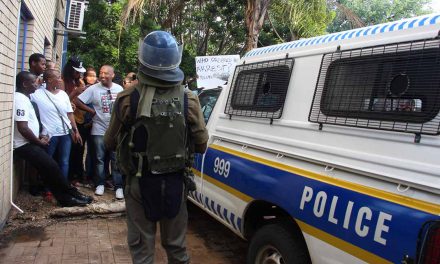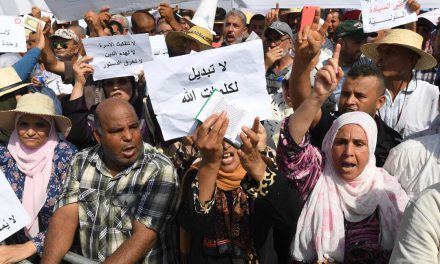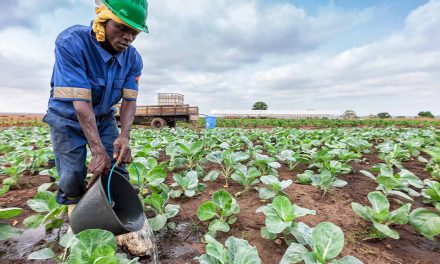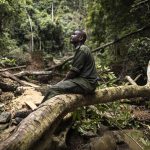South Africa’s president, Cyril Ramaphosa, agreed to an ambitious deal in climate finance with leaders from Germany, France, the United Kingdom, the European Union and the United States at the 26th UN Conference of the Parties to the Framework Convention on Climate Change (COP26) in November last year.
Ramaphosa and his team had mostly done their homework ahead of the summit in Glasgow. In 2018, the president convened a Presidential Commission on Climate Change as an outcome of a Jobs Summit. The commission actively engaged stakeholders across the country in numerous meetings on aspects of a “just transition” as well as the consultation on South Africa’s Update of its Climate Change Plan from early 2021.
Eskom, South Africa’s state-owned utility for electricity generation, transmission, and distribution stands at the core of the debates on a “just transition”. The utility has historically managed South Africa’s 18 coal and sole commercial nuclear power plant. Eskom generates about a quarter of Africa’s electricity. An unsustainable business model and poor management over decades has left Eskom with R420 billion ($27.7 billion) of debt, half of which is considered unserviceable. In desperate attempts to “keep the lights on” – a longstanding credo in Eskom’s senior management – the company has adopted even more unsustainable practices, including generating electricity from diesel at twice the cost of residential tariffs for extended periods.

Smoke spreads from the cooling towers of the synthetic fuel plant in Secunda, South Africa. Secunda is one of the largest coal liquefaction plants in the world, producing petroleum-like synthetic crude oil from coal. Photo: Mujahid Safodien/AFP
Simultaneously, Eskom’s coal contracting practices evolved into a central mechanism of “state capture” during the second term of the Jacob Zuma administration (May 2014-February 2018). During this period, the successes of the Renewable Energy Programme (REIPPPP), which was established in 2014, were slowly dismantled. This competitive bidding programme allowed for the generation of renewable energy at large scale in South Africa for the first time in history. It also broke Eskom’s monopoly in generating electricity as it invited Independent Power Producers (IPPs) to offer competitive prices as part of an auction scheme. The long-awaited fifth bidding round was announced just in time for COP26 last year, after a painful break of seven years between the fourth and fifth rounds. It produced record prices as low as 34c/per kwh.
In an economic reconstruction and recovery “coronavirus pandemic relief package” President Ramaphosa announced the fast tracking of the government’s Integrated Resource Plan (IRP) as a priority. The plan suggests completing the installation of 31 GW of renewable energy and to decommission 11GW of coal by 2030, following the principle of policy coherence to “drive the transition towards environmentally sustainable and inclusive economies and societies.”
Yet, there is no such thing as a singular “just transition”. In the social sciences, we would want to differentiate conceptually between “socio-technical transitions” and the “social justice” concerns emerging in each change in technology. Why? Thinking about a single “just transition” might lead the conversation away from the nuances that matter for successful transition management. Transitions are ultimately about people doing things differently. Technological change occurs through the interaction of people in nonlinear ways: businesses produce and trade technologies and consumers choose to use or reject different technologies.
Technological innovation creates benefits for some people, while others may experience losses from phasing out other technologies. Some may feel left out or find themselves deprived from access to the benefits of technological change all together. Successful transition management requires a solid understanding of the benefits and their fair distribution. These differ from technology to technology.
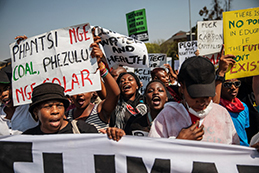
Protesters sing while holding up placards against climate change during the “Fridays for Future”, a rally in Johannesburg as part of a global climate action day on September 20, 2019. Photo: Michele Spatari/AFP
It is undeniably difficult to navigate socio-technical transitions in such a highly unequal society. But it is crucial to recognise the narrowness of current “just transition” processes when benchmarked against the texture of the broader society and the aspirations that we have for its transformation. If these processes are not going to be more broadly inclusive of the most vulnerable, then we all need to recognise that this exclusion is the harsh reality that the vulnerable will need to navigate. The state especially needs to recognise this, and rather than blaming the vulnerable for their situation, put basic social protection and employment policies in place that explicitly seek to support them in navigating these actual social and economic realities.
South Africa’s “just transition” process has been mainly guided by a Presidential Climate Commission (PCC), which has an advisory role to the government and in 2020 took over the work initiated by the National Planning Commission in 2011. The commission now touches on many important aspects of social justice in different sectors, research, skills, and knowledge generation beyond the initial consideration of employment. The generalised use of the term “just transition” is puzzling, not only regarding the lack of consensus on its definition but also the acknowledged need for differentiated definitions and approaches from each of the diverse actors affected by socio-technical transitions. While the PCC’s strength resides in its mandate and the diversity of its commissioners, its work also unveils the complexity of the multi-actor approach where contradictions appear between different visions and definitions of the “just transition”.
Urgent action to secure clean electricity supply is yet to be seen. At the time of writing this article, Eskom experienced unplanned outages of 15,485 MW with another 4,100 MW in planned maintenance. These numbers add up to frightening losses of almost half of the installed capacity in South Africa. Why wait, if cost-effective solutions are available to supply climate neutral electricity to the benefit of all?
Secure supply of clean electricity stands at the core of sustainable economic recovery. The focus on reducing the role of coal as a central component of the “just transition” has triggered resistance to renewable energy, which overshadows the multiple benefits of these technologies. Yet, the economic cost of intermittent electricity supply in South Africa result from poor decision-making on future electricity technology and continuously threatens many more jobs beyond the coal sector.
The decline in the cost of clean energy technologies can reduce the price of business infrastructure and of crucial services for those in the bottom half of income distribution. Coal and nuclear plants turn out to be more expensive, more vulnerable to corruption, less labour intensive and at higher risk of turning into stranded assets. The international “just transition” framework agreement is currently as vague as the concept itself. The envisioned transitions in coal, electric vehicles, renewable energy, and a hydrogen economy will require detailed engagements to understand the concerns of beneficiaries and potential losers and to then take action that benefit inclusively.
These processes need to include its opponents. In South Africa, critical voices from within the same government continuously push back against climate action. Minister Gwede Mantashe, in charge of South Africa’s ministry for mineral resources and energy, called for a pan-African expansion of fossil fuels in his first public appearance after the president, the minister of public enterprises and Eskom’s CEO announced the climate finance deal at COP26. These clashing narratives between a right for fossil fuel intensive development in Africa and the Global South, and the call for climate action in favour of a broader, more inclusive society remain a serious concern, both for the challenge of reducing the pace of global temperature rise and for sustainable development.
Would you like to gain an understanding of your own impact on the environment? Calculate your own carbon footprint here



